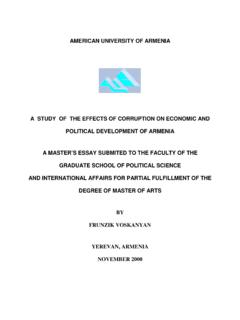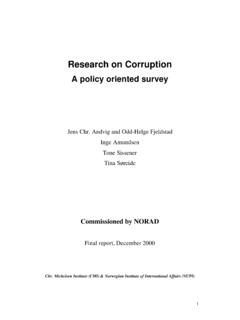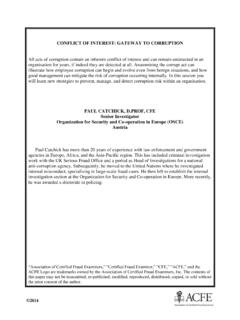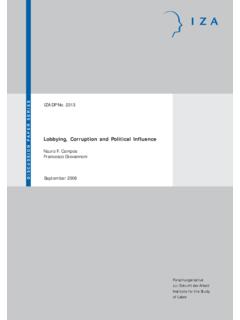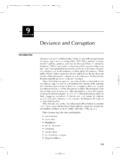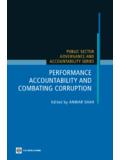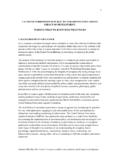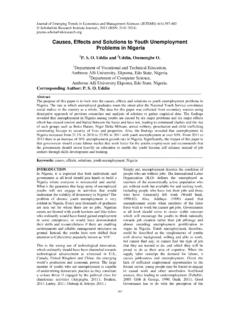Transcription of THE EFFECTS OF CORRUPTION - GNPAI
1 THE EFFECTS OF CORRUPTION . The effect of CORRUPTION has many dimensions related to political, economic, social and environmental EFFECTS . In political sphere, CORRUPTION impedes democracy and the rule of law. In a democratic system, public institutions and offices may lose their legitimacy when they misuse their power for private interest. CORRUPTION may also result in negative consequences such as encoring cynicism and reducing interest of political participation , political instability , reducing political competition, reducing the transparency of political decision making, distorting political development and sustaining political activity based on patronage, clienteles and money, etc. In our society, the impact of CORRUPTION is often manifested through political intolerance, problems of accountability and transparency to the public, low level of democratic culture, principles of consultation and participation dialogue among others.
2 The economic EFFECTS of CORRUPTION can be categorized as minor and major. However, both in one way or the other have serious impact on the individual community and country. First and foremost, CORRUPTION leads to the depletion of national wealth. It is often responsible for increased costs of goods and services, the funnelling of scarce public resources to uneconomic high profile projects at the expense of the much needed projects such as schools, hospitals and roads, or the supply of potable water, diversion and misallocation of resources, conversion of public wealth to private and personal property, inflation, imbalanced economic development, weakling work ethics and professionalism, hindrance of the development of fair in market structures and unhealthy competition there by deterring competition. Large scale CORRUPTION hurts the economy and impoverishes entire population. In Social sphere, CORRUPTION discourages people to work together for the common good.
3 Frustration and general apathy among the public result in a weak civil society. Demanding and paying bribes becomes the tradition. It also results in social inequality and widened gap between the rich and poor, civil strive, increased poverty and lack of basic needs like food, water and drugs, jealousy and hatred and insecurity. Closer home, CORRUPTION is said to have been factors for the down fall of past regimes byway of undermining the legitimacy of the governments and weakening their structures, reducing productivity, hindering development, worsening poverty, marginalizing the poor, creating social unrest and then to their downfall. THE NEGATIVE EFFECTS OF CORRUPTION ON DEVELOPING NATIONS - Written by Brima Karl Samura Introduction CORRUPTION in developing countries continues to be one of the greatest factors of poverty, development and internecine conflicts. Although many developing nations especially in Africa are endowed with priced natural resources, yet they continue to struggle and scramble for position in the lower rungs of the United Nations Development Index.
4 Most developing countries continue to grapple with the ever changing trends in global politics, economic and technological advancements having little or nothing to do due to the debilitating EFFECTS of CORRUPTION on their very existence. From Zimbabwe to Nigeria, from DR Congo to Sierra Leone, CORRUPTION continues to have an adverse effect on the lives of the vast majority of the population. Sierra Leone, for instance, was ranked 122 among 149 nations in the 2007 CORRUPTION rankings. [1] This article seeks to look at some of the root causes of CORRUPTION in Third World Countries generally but with specific focus on efforts to confront it in Sierra Leone. It proffers recommendations to be considered in the unyielding fight to eradicate it. Defining CORRUPTION Understanding the concept of CORRUPTION presupposes that one should have a clear dichotomy of what it entails and what constitutes it in the simplest term. There is no single accepted definition for the term CORRUPTION because what may seem corrupt in one society may not necessarily be perceived as such in another.
5 Though there have been different attempts to define it, there is no precise, clear definition that can be applied to all forms, types and degrees. According to Carl Friedrich, CORRUPTION is a kind of behaviour which deviates from the norm actually prevalent or behaved to prevail in a given context, such as the political. It is deviant behaviour associated with a particular motivation, namely that of private gain at public expense. [2] The Oxford English dictionary defines CORRUPTION as Pervasion or favour, the use or existence of corrupt practices especially in a state, public CORRUPTION , etc. The most commonly used and popular definition is the one given by Leslie Palmier [3] according to this definition, CORRUPTION is seen as the use of public office for private advantage. This definition is directly in line with Section 44 of Sierra Leone s Anti CORRUPTION Act 2008 which deals with the use of public office for private or personal aggrandisement.
6 Causes of CORRUPTION Developing economies are predominantly buffeted with barrages of corrupt practices that have deep anchorage in the socio-political and cultural psyche and existence in such nations. This is particularly so in Sub Saharan Africa where majority of the populations especially in the rural areas suffer untold hardship as a result of what can be termed as organised or systematised CORRUPTION . The causes of CORRUPTION are numerous and the situation is often similar in many ways among developing countries especially so among African countries as are discussed below. Patronage ties between political elites and those they represent often place heavy informal obligations and demands on the former. Typically, such elected representatives are not only overwhelmed with financial pressure from their family, but also from kin, clan, hometown and tribal or ethnic constituents. Such obligations are almost always fulfilled through corrupt means.
7 Thus the participants in CORRUPTION are many besides the politician or elite who actually engages in the act. Because of the absence of state welfare institutions in much of Africa, political constituents expect politicians representing them to cater to their quotidian and small scale infrastructural needs. [4] In other words neo-patrimonial regimes become the rule, and the state emerges as an extension of the ruler s household, patronage, ethnic and kinship ties and bribes become major modes for governance. CORRUPTION funded patronage to kinsman and crimes have exacerbated regional, tribal, religious and ethnic divisions. [5]. Another cause of CORRUPTION is psychological. There are numerous psychological factors that can help to explain some types of CORRUPTION . Internally, some people are naturally evil and will commit criminal acts, including corrupt ones in any type of system. Pressure and peer comparison can contribute greatly to acts of CORRUPTION especially so where the socially revered are the corrupt ones.
8 This presupposes that in an environment where an individual see others around him/her benefiting from CORRUPTION , they may well choose to indulge too. Nepotism, that is, helping others because they are closely related to you can also be related in psychological term. The clich blood is thicker than water is common parlance in Sierra Leone. This can also be explained in terms of people wanting to entrench themselves or maximise their hold on power. Moreover, monopoly of power can also be a cause of CORRUPTION in Africa. This could often apply or exist for the simple reason that people in power are the ones mainly charged with the responsibility governing. Thus, out of discretion they can expend such powers to perform acts of CORRUPTION as maybe dictated by their circumstances. Furthermore, weak judicial system is also a serious cause of CORRUPTION . Most often, judicial systems are weak as a result of poor conditions of service.
9 In such situations, it is the poor people that suffer the brunt of injustices as the rich always stand a better chance of getting justice over the poor. Furthermore, the absence of clear-cut separation of powers between the judiciary and executive arms often results in the latter exercising undue influence over the former. Such undue influence is most pervasive in situations where there is no guarantee of security of tenure for the judicial officers. In Sierra Leone, for example, the President has the power to appoints judges on contractual basis after their retirement without security of tenure of office. EFFECTS The impact of CORRUPTION on developing countries cannot be overemphasized. The results are often disastrous. The eleven year civil conflict in Sierra Leone, for instance was largely attributed to pervasive CORRUPTION in all spheres of governance. The occurrence of CORRUPTION in large scale reflects in many areas of development and is intrinsically linked with under development.
10 Poor conditions of service as is the case in many developing countries open the door to bribery. Corrupt officials often accept substandard quality of service because of kickbacks thus depriving the country of value added service from contractors and consequently resulting to the implementation of water washed roads or schools. Health care facilities remain inadequate and inaccessible because most times, drugs meant for especially children and women particularly in provincial clinics and hospitals could be easily seen on the shelves of private pharmacies. One of the greatest impacts of CORRUPTION normally arises out of the choices and priorities of governments. This occurs when the real development priorities of a country are often neglected in favour of those that generate the greatest personal gains for the decision makers. Here, it is clearly evident that many projects have become white elephants and easy route for personal enrichment.
